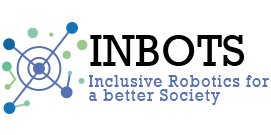 This year, to increase the impact of the INBOTS Project we decided to celebrate the event named as INBOTS Conference with a number of workshops, conferences and meeteings that took place during the European Robotics Forum (ERF) 2019 edition in the rumanian city of Bucharest.
This year, to increase the impact of the INBOTS Project we decided to celebrate the event named as INBOTS Conference with a number of workshops, conferences and meeteings that took place during the European Robotics Forum (ERF) 2019 edition in the rumanian city of Bucharest.
We started our workshops with one on Ethics and Corporate Social Responsibility for Inclusive Robotics, Vincent Müller shared his views on Ethics of Artificial Intelligence and Robotics. Aníbal Monasterio Astobiza referred to values in the design of robots, taking into account the functional diversity of end-users. Amparo Grau pointed out the opportunity for companies to have a positive impact on society by implementing inclusive robotics through their Corporate Social Responsibility Strategies. Freygardur Thorsteinsson explained how Össur has approached to this subject. Heike Felzmann stressed potential points of conflict regarding existing expectations of inclusiveness of interactive robotics. Surprisingly, Responsible Research and Innovation was still unknown to a part of the audience.
On the second day Roberto Conti, from IUVO, contributed to a workshop of the COST Action on wearable robotics where he introduced the INBOTS project
Later on, Professor María Amparo Grau, at the workshop on Sustainable Public Policies for Innovation and the Future of Work explored the economic and legal consequences of introducing interactive robots in our society. Ronja Roettger summarised the recent work carried out by the High Level Expert Group on the impact of the digital transformation on EU labour markets. Robin L. Pierce made the case that policies will need to acknowledge the motivation of existing norms in healthcare and allocate appropriate responsibility to the multiple actors. Maria Luz Vega explained the recent report of ILO on work for a brighter future. Amparo Grau defended the use of tax benefits for training workers in the digital economy transition phase. Luke Mc. Donagh dealt with innovation and how to share its benefits. Eduard Fosch proposed voting on some controversial issues, such as the convenience of an Observatory of decision-making processes for the regulation of robotics in the EU. Francesco Ferro gave the PAL Robotics’ vision on all these matters.
We had two workshops about education on robotics. The first one, chaired by Gerald Steinbauer, in collaboration with INBOTS, had three 5-min talks by Thilo Zimmermann (Fraunhofer IPA, Industry View), Gerhard K. Kraetzschmar (Hochschule Bonn-Rhein-Sieg, Academia View) and Gerald Steinbauer (Technische Universität Graz, K-12 View); followed by a discussion in which participants were divided in three groups chaired by two organizers each, and invited to discuss the following topics:
- Challenges in Robotics Education – K-12, Academia, Industry contents topics, inclusion, formats & settings, pipeline, …
- Educational Resources and best practices: curricula, platforms, and tools, dissemination, competitions, …
- TG Education: goals, activities, expected service, next steps, persons.
In the second workshop, participants could directly interact with two systems: the first was an exoskeleton ( https://www.eduexo.com/) provided by ETH, the second one was a simulation environment in which participants could try to control TIAGO robot (http://tiago.pal-robotics.com/), provided by PAL robotics. Overall, participants were satisfied and though the interactive organization that we attempted to set up, we had the possibility to directly contact participants, get propositive feedbacks and establish connections that could be useful for INBOTS project too.
 The ERF workshop on “Standardisation in Robotics” was for standardisation experts and those that are new to the topic. The highlights of this session were the discussion of the results of the INBOTS Standardisation Survey, the overview of activities of ISO/TC 299 on robotics, the discussion on how to structure standards in the future and the current state of the art of brain-computer interfaces and their standardisation status. The discussion evolved around the status of standards and that the majority of users would encourage a cost free availability of standards and that they miss information on the connection between already existing standards. Overall the robotics community would like a better description of the boundaries between robotics application and domains, but so far a solution has not been found.
The ERF workshop on “Standardisation in Robotics” was for standardisation experts and those that are new to the topic. The highlights of this session were the discussion of the results of the INBOTS Standardisation Survey, the overview of activities of ISO/TC 299 on robotics, the discussion on how to structure standards in the future and the current state of the art of brain-computer interfaces and their standardisation status. The discussion evolved around the status of standards and that the majority of users would encourage a cost free availability of standards and that they miss information on the connection between already existing standards. Overall the robotics community would like a better description of the boundaries between robotics application and domains, but so far a solution has not been found.

